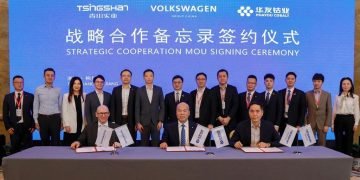Article for The Logistic News
Chinese Original Equipment Manufacturers (OEMs) are accelerating their vertical integration strategies in Finished Vehicle Logistics (FVL), reshaping global automotive supply chains. As China’s automotive sector expands its footprint in export markets, leading manufacturers are investing in in-house logistics operations, dedicated shipping fleets, and streamlined distribution networks to gain greater control over their supply chains.
Why Chinese Automakers Are Prioritizing Vertical Integration
✅ Growing Global Demand for Chinese EVs & Automobiles
Chinese automotive exports, particularly electric vehicles (EVs), have surged in recent years. To improve cost efficiency and delivery reliability, Chinese OEMs are reducing their reliance on third-party logistics providers by managing vehicle transport, shipping, and distribution in-house.
✅ Control Over Costs & Supply Chain Efficiency
By owning and operating logistics assets, automakers can optimize vehicle distribution, reduce transit times, and cut operational costs. This approach minimizes risks associated with external disruptions, shipping bottlenecks, and logistics delays.
✅ Investment in Dedicated Shipping Fleets
Major Chinese OEMs are securing their own cargo vessels and car carriers to avoid freight capacity shortages and rising transport costs. Companies like BYD, Geely, and Chery are expanding their shipping networks, ensuring seamless global vehicle deliveries.
✅ Expansion of Distribution & Export Hubs
To support growing international demand, Chinese automakers are establishing regional vehicle processing centers and dedicated ports for exports. These strategic hubs allow for faster deliveries and better adaptation to foreign market regulations.
Implications for Global Automotive Logistics
🚗 Increased Competition Among Logistics Providers – As Chinese OEMs internalize logistics operations, traditional Finished Vehicle Logistics (FVL) providers may face reduced demand for third-party services.
🚗 Greater Resilience in Automotive Supply Chains – Vertical integration allows OEMs to bypass global shipping bottlenecks and secure dedicated transport solutions, reducing exposure to supply chain disruptions.
🚗 Potential Price Advantages for Chinese Automakers – Controlling logistics costs could enable Chinese brands to offer competitive pricing in global markets, especially in regions like Europe, Latin America, and Southeast Asia.
The Future of Finished Vehicle Logistics
As Chinese automakers scale up global production and exports, their logistics networks will continue evolving, with investments in:
🔹 Smart tracking & AI-driven fleet management
🔹 Green logistics solutions for EV transportation
🔹 Dedicated FVL hubs in key export markets
🔹 Expansion of multimodal transport networks
Conclusion
The vertical integration of Finished Vehicle Logistics by Chinese OEMs marks a transformative shift in global automotive logistics. By controlling shipping, distribution, and supply chain operations, Chinese automakers are strengthening their global market presence, reshaping automotive supply chains, and challenging traditional FVL providers.
#FinishedVehicleLogistics #ChineseOEMs #EVExports #AutomotiveSupplyChain #LogisticsInnovation #FVL #VerticalIntegration #TheLogisticNews























